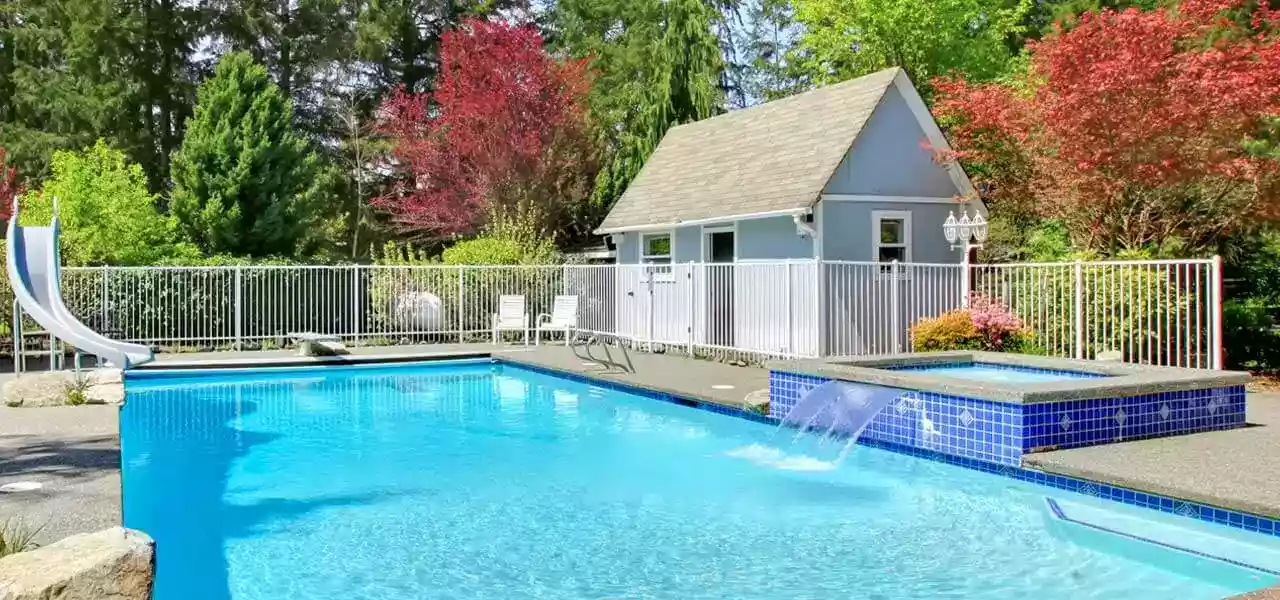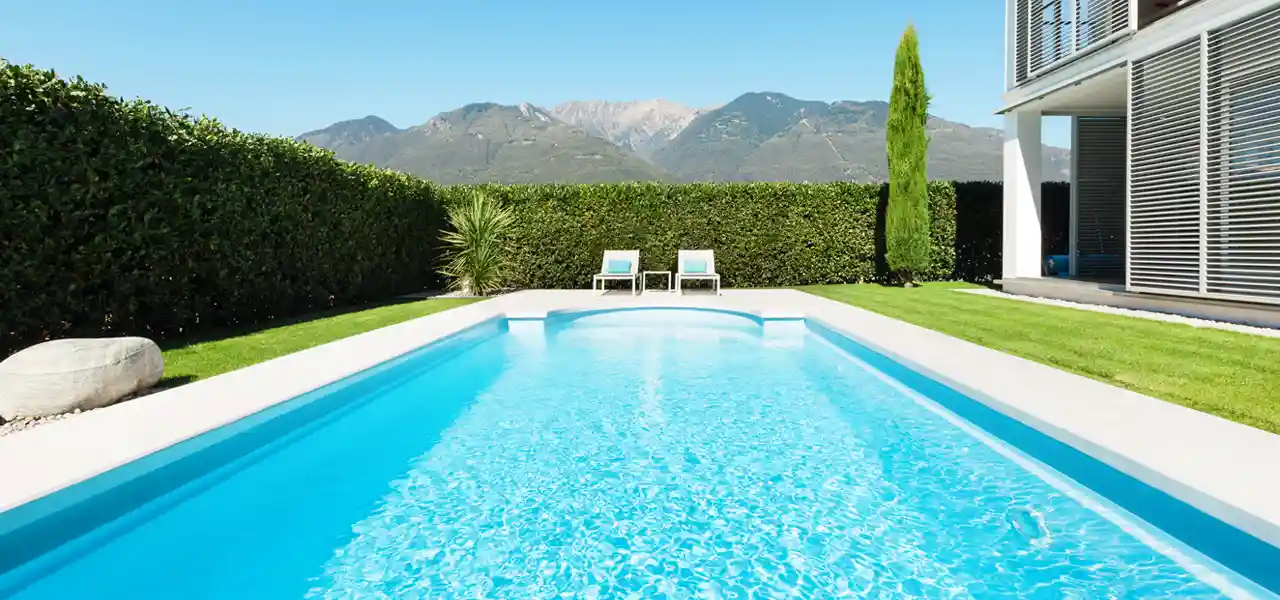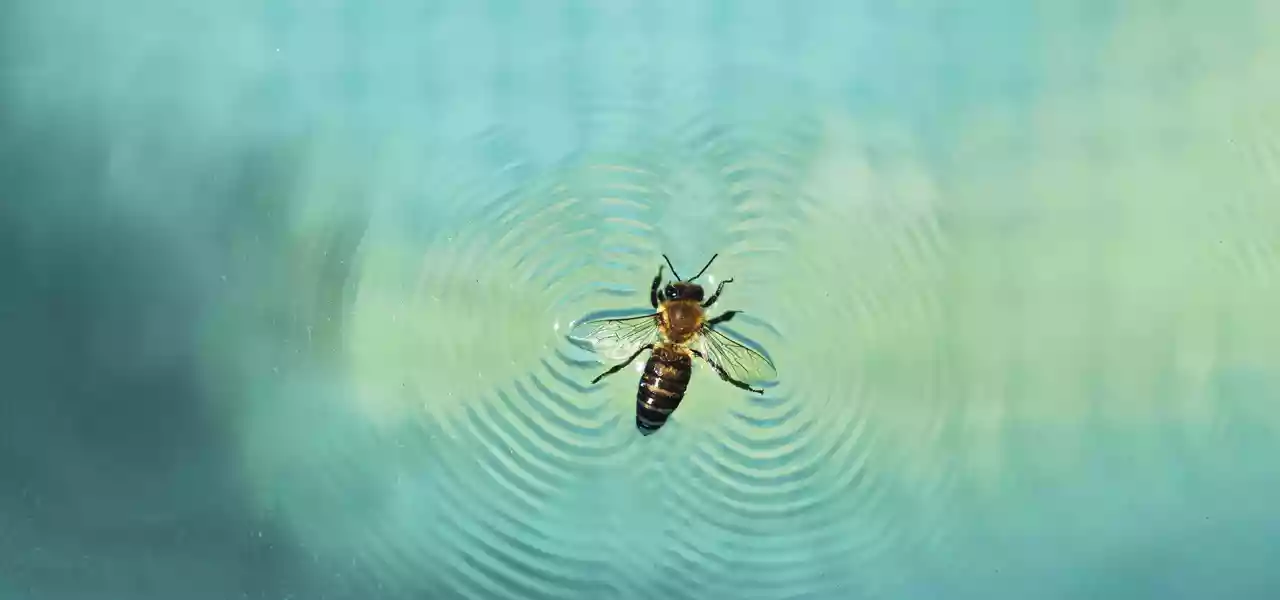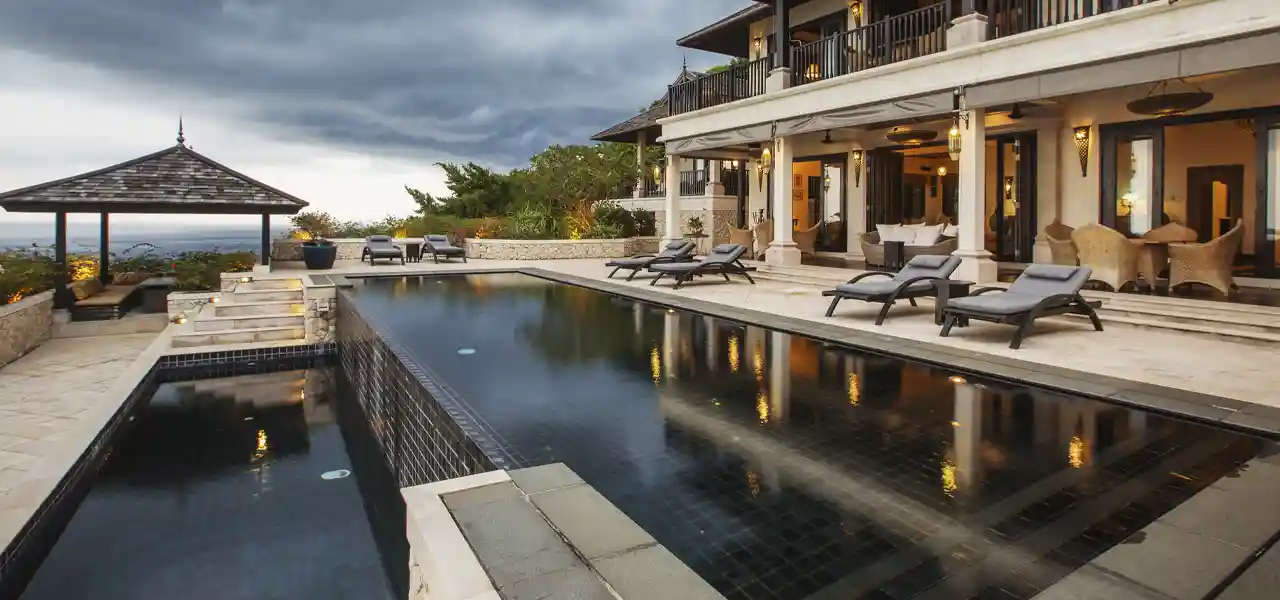If you’ve ever wanted to hide your pool pump and filter, this post is for you! A pool equipment enclosure not only keeps your backyard looking tidy, but also protects your costly pool equipment from being damaged by the sun, rain, snow, or anything else Mother Nature has to offer.
While it’s not necessary to cover and enclose pool equipment, many pool owners want a way to keep their equipment safe and their backyard pretty. And thankfully, there are endless ways to create a pool equipment enclosure, no matter your taste or budget.
Should You Enclose Your Pool Equipment?
Pool equipment — pumps, filters, pipes, etc. — are designed to be outside and withstand the elements. It’s not mandatory to enclose them or cover them, as long as they are safe from severe storms or natural disasters. That being said, they are costly, vital pieces of equipment that last longer with proper care and maintenance.
There are three main types of pool equipment enclosures: walls, boxes, and sheds. Walls are the quickest and easiest way to enclose your pool equipment. While boxes and sheds offer more equipment protection, coverage, and storage space. Let’s discuss each option further…
Pool Equipment Enclosures — Walls

The simplest way to hide your pool pump and filter is to put up a small wall or screen to block the view, and the noise from the pump.
If you are handy with wood, you can saw-up your own pool filter screen to hide the pool pump, or you can buy vinyl privacy walls at most home stores and garden centers. As a third option, hire a carpenter to take care of it all for you!
Screens to Hide Pool Equipment
Most privacy screens that you can purchase from a home improvement store are made of vinyl resin. Using pre-fab vinyl fence panels has many advantages:
- Affordability — Most privacy screens have connected stake-like legs on the bottom that secure the screen panels into the ground for stability. Sectional and modular panels are connected with steel bolts, and can be angled into many positions.
- Durability — Vinyl doesn’t fade in the sun or rust in the rain. This durability will keep these enclosures looking new for years. When the panels get dirty, simply spray them with a garden hose.
- Variety — There are many types of vinyl screen panels readily available almost everywhere. You can find traditional picket-fence, or prairie-style panels, or go for colors and textures molded to look like real wood panels or bamboo sheets.
Another way to enclose your pool equipment is to make an enclosure yourself! Depending on your abilities, time, and resources, this can be a fun and creative way to give your backyard a unique look and character.
Wood
Whether it’s natural wood, stained, painted, or repurposed from another project, wood is an elegant and timeless construction material. It is easy to handle and has great longevity, especially when sealed with a water-resistant sealant.
Concrete
Constructing concrete walls takes some real talent and special tools, but if you know how to create a concrete enclosure, you will have a unique and highly durable enclosure. If you choose concrete, which is porous, remember to use a sealant product.
Stone
This material has incredible variety, from small, round pebbles to long, flat blocks like flag stone, along with different colors, shapes and textures. Like concrete, creating stone walls or enclosures takes an advanced skill set, but results in a natural and classic finished product.
Glass
For ultra-modern homes, glass panels are the ideal material for pool-equipment-hiding enclosures. Depending on your budget, you could surround your entire pool with privacy glass.
Vinyl
Much like the ready-to-assemble vinyl panels you can buy at the big home improvement stores, vinyl is available in board-like planks. Many places also offer vinyl boards made from recycled materials, and with life-like wood grain color and texture.
Pool Equipment Enclosure — Boxes
A box offers more protection from the sun, rain, and other elements for your pool equipment than a walled enclosure. Boxes usually have hinged lids for easy access to your equipment. Obtaining proper equipment size measurements is key to building a quality box. If the box fits too snug around the perimeter of your equipment, there won’t be enough room to access the equipment for repairs or maintenance. Always add a few extra inches, or even a foot, to the width, height, and length measurements.
Pool Equipment Enclosures — Sheds

There’s one more option for the pool equipment enclosure possibilities — an equipment shed. Sheds fully protect your equipment, while also offering space to store pool toys, supplies, and chemicals.
Whether you build one from blueprints or get a DIY kit, a shed is a great way to conceal your equipment. You can store other items in the shed, including yard tools, pool toys, pool floats, and even smaller pieces of pool furniture.
Pool Equipment Enclosure — Design
- Construct high ceilings and put in windows for proper ventilation.
- Allow enough room for equipment repairs and services. In addition to room for pool supplies, furniture, and maintenance equipment storage.
- Chlorine chemicals, even in tightly sealed buckets, will rust metal on pumps, filters and heaters.
- Heaters or heat pumps cannot be enclosed. Pool heaters need proper air supply and exhaust venting. If enclosed around the sides, be sure the top is open to clear sky, or follow manufacturer instructions for proper venting.
Depending on your budget, the choices of ways to hide your pool equipment is endless. From simple and affordable, to lavish and costly, research and discover what works for you and your yard. Be sure to plant, build, or install something compatible with your regional climate, as well as your style and taste.
We hope you enjoyed this look at pool equipment enclosures. From a simple 2-wall wood enclosure to custom pool cabanas, there are plenty of ways to hide your pool pump!





Hi,
I was wondering if i can house the pool pump and pentair Mastertemp natural gas heater together in a concrete enclose? Would i just need a chimney coming out the top for the heater and perhaps a vented door would be a good idea?
Thanks in advance
Jonathan, yes you could enclose the equipment, but the heater does need good ventilation in/out and for safety, it must be done in accordance with the owners’ manual, which covers venting in great detail. Heaters produce carbon monoxide, and can be dangerous if not vented correctly.
We just installed an above ground pool and are having a 4’ deck all the way around. Need advice on how to still have access to the pump and skimmer and still have the deck.
Hi, what most people do is just position the filter under the deck, and then walk around to the area where is sits, exposed, under the deck. If this is impossible due to the size of the deck, or other obstructions, you can either move the filter equipment to a safely accessible location, or install a trap door with a small ladder, to access the equipment. Be sure to leave enough room for service to the filter, removing the lid especially, for cartridge or DE filters, and enough room to work, and a light to see with. It’s not fun working stooped over either, so if you can make modifications to work comfortably, you or your pool guy, will appreciate it later.
Hello – I am looking for some type of cover (maybe a mesh screen or something like / else) to go over and cover all pool equipment with the ability to lift up and walk in. My pool equipment is surrounded by a 5 foot semi circle / oval block wall. I envision this cover going over the wall from edge to edge but being able to lift up (hinges?) to walk in to manage equipment. Any thoughts? Thank you very much. Jack
Jack, you can build a frame from wood, and mount it to the back wall with hinges, and use locking piston arms or side hinges to hold it up while inside. Cover the frame with a mesh sport fence fabric, or regular screen door material. All these items can be found at your local HD or Lowes.
Hello….could I build this to go around my heater as well as around my filter, pump, etc.? It wouldn’t be enclosed over the top but more surrounding it and far enough away to avoid a fire hazard? It’s very windy on the side of my house and the wind knocks out my heater all the time – need some time of enclosure around the sides to keep this from happening. Thank you!!
Hi Brian, yes absolutely you can, just give enough room around the heater to be safe. Consult the owners manual for guidelines. You can also place a high-wind stack on the heater that prevents down drafting, if that is the wind problem that occurs…
How to make sure we do not damage underground pipes when digging hole for fence post for fence around pool equipment
Good question, I guess just dig slowly. Be sure to Call811 to mark underground utilities. I’m not sure if they can locate PVC pipe however, maybe?
Where can you purchase some of the metal pool pump enclosures like that are pictured?
Hi Josh, the metal slat enclosures are from an Australian company, they are quite popular down under. You may find something similar stateside with outdoor furniture companies, who often have outdoor boxes for storing cushions and such. Or you could buy slats of steel, and fashion a box out of wood ends and steel slat front/back, with some sort of top.
I’ve replaced the wiring on my Sta-Rite heater 4-5 times due to pack rat infestation.
While I have tried to deal with the elimination of the critters I’m looking for a wire / mesh enclosure. Any thoughts?
Hi Ken, I have heard that moth balls or mint leaves can keep them away… or get some chicken wire, and wrap the heater with it, with a clasp that can be removed easily to open up the front of the heater when needed. They can enter thru a broken floor panel, crawl thru the gas pipe or wiring knockouts, or wiggle thru the gap around the front heater – possibly may be able to access via the heater top, depending on model. Closing up all access points should be a winner, and maybe planting mint around the heater, and putting a box of moth balls inside the cabinet.
Hi Sheryl
I need to get an equipment box that is secure. My equipment has been stolen twice. Once during construction and once since. I see a gray on in your pictures that may be secure enough. If you know where I can go to find some it would help greatly. Thanks
Rob
Hi Rob, I’ve heard of that – pool equipment theft – geez, I’m sorry. The grey one, with the lift up lid? That’s from Australia, where pool equipment enclosures are more of ‘a thing’. There are giant boulders (fake) that can be used to cover equipment, if your system is small. Or you can just build a small storage shed around the equipment, with a lock on the door. Any good carpenter could build something custom and very secure, and also hide it, if it’s visible from the street or from the air…?
What is the best material for dampening pool pump noise when you build this enclosure?
Hi, a solid concrete base is best, (not wood, which resonates more), and bolting the pump to the concrete, and if you want to go all the way, using a thick rubber pad, or even a thin one, between the pump and concrete. Leaving open space on the back of the enclosure, away from the house is sometimes done. with the right design, sounds can be aimed away from the filter system (and house) and into dampening areas of the yards, with tall grasses perhaps. Sound reflects well, so if there is a wall right behind the equipment, that will reflect the sound back towards the house. Look for our upcoming blog post (next) about using landscaping to hide equipment (and dampen motor noise). good questions, thanks!